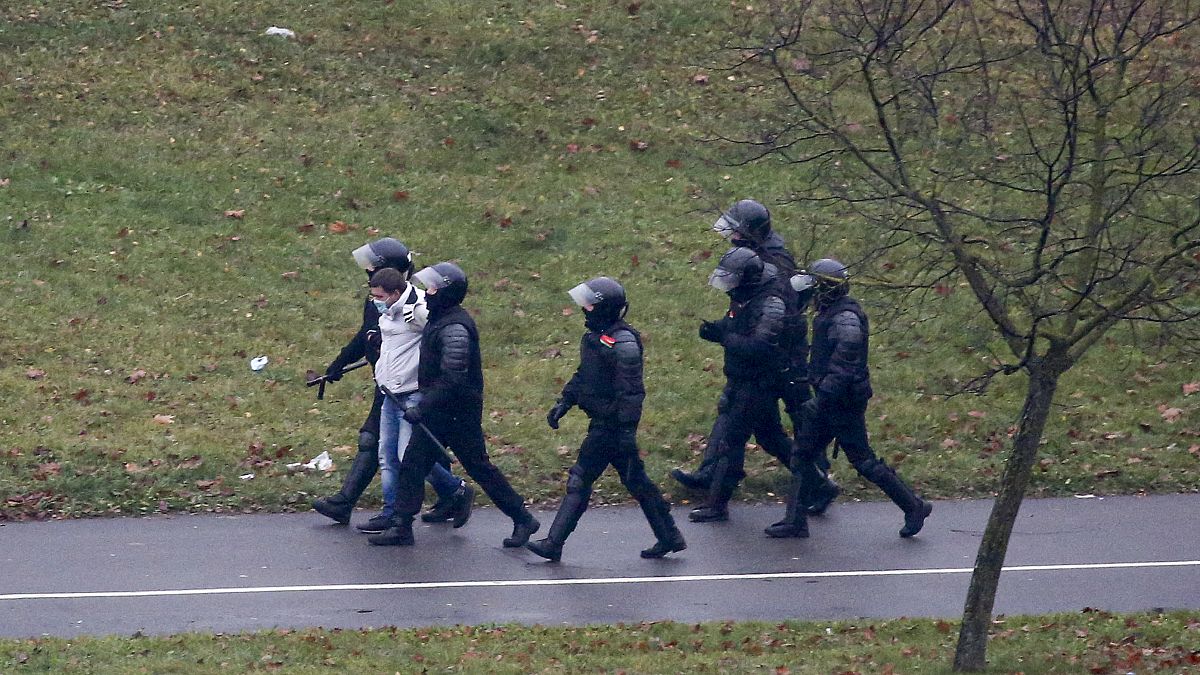Belarusian prosecutors say that at least 400 people have been convicted for participating in opposition demonstrations against President Lukashenko. But what about all the others that were arrested?
Belarusian authorities have convicted more than 400 people so far for taking part in opposition demonstrations, according to prosecutors. But if that number seems small to you, you are not alone.
Thousands of people have been arrested by security forces since the disputed election in August 2020, which sparked a mass protest movement against President Alexander Lukashenko.
The president claimed to have won a sixth term in office by a landslide, but opposition leaders, swathes of the public, foreign governments, and NGOs all dispute the result.
Belarus' General Prosecution Office said on Wednesday that more than 600 people have been charged for participating in "mass riots".
"To date, prosecutors have sent 468 criminal cases to courts against 631 persons who are associated with participation in illegal mass events and actions that grossly violate public order," the office said in a statement.
"More than 400 people have already been sentenced."
That number however represents just a small portion of the total number of arrests that have been made since the election.
“We have 290 political prisoners, and the majority of them have not been tried yet, they just have been kept as hostages for the regime,” says Hanna Liubakova, a Belarusian journalist and non-resident fellow at the Atlantic Council think tank.
“Then we have more than 2,000 criminal cases that were launched by the interior ministry. We also do not know how many people are suspects in these criminal cases.”
Prosecutors say demonstrators have been arrested for threats of violence against the authorities, desecration of state property, and hooliganism, as well as violating public order.
While prosecutors warn "not a single guilty person will escape responsibility," Liubakova tells Euronews those being kept in prison apparently without trial are being mistreated "both physically and emotionally".
"Firstly they are totally isolated from correspondence, from letters, from information, and that makes them feel abandoned, and as if nobody cares.”
She highlights accusations that at least 1,000 people were tortured and ill-treated by police whilst in custody in prison.
Both women and men have faced sexual abuse, they have been kept in stress positions for hours, held in overcrowded cells, and denied basic sanitary conditions, she adds.
According to human rights activists, the harshest sentence handed down so far has been 10 years in prison.
Those imprisoned have no legal recourse, and the trials are a sham, Franak Viačorka, a senior advisor to the exiled opposition leader Sviatlana Tikhanouskaya, tells Euronews.
“These are not real trials. The goal of them is to threaten others, to prevent others from participating in peaceful resistance.”
He says many of those detained in the summer around the time of the election, have since then been awaiting trials, but in reality “they are kept in prison to prevent them from organising people, from speaking to the media to reveal the truth about the situation in the country”.
But echoing the stance of Tikhanouskaya, Viačorka says “there is no way back”, and a peaceful resolution, and new elections must be the outcome from all this.
“We see no chance to prevent people from protesting. We expect the next wave of rallies, maybe even this month, March 25, and the protests along with economic resistance and other forms of disobedience must lead to negotiations.”
He hopes that authorities, but “not necessarily Lukashenko”, will realise the continual escalation of repression against peaceful protesters will not resolve anything.
“We hear more and more voices in the regime who want changes as well. They write to us, they talk to us, they share our approach and our roadmap to the resolution. They don’t want to participate in the bloody crackdown,” he insists.
Faced with constant demonstrations by tens of thousands of people, Belarus' government gradually muzzled the protest by imprisoning opponents or forcing them into exile.
Sviatlana Tikhanouskaya, currently residing in Lithuania, has called for further demonstrations on 25 March, the day Belarus celebrates its declaration of independence in 1918.
The crackdown in Belarus has been condemned by Western countries, with the EU and the US imposing sanctions on individuals close to President Lukashenko.
